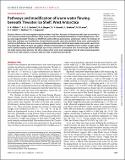Pathways and modification of warm water flowing beneath Thwaites Ice Shelf, West Antarctica
Abstract
Thwaites Glacier is the most rapidly changing outlet of the West Antarctic Ice Sheet and adds large uncertainty to 21st century sea-level rise predictions. Here, we present the first direct observations of ocean temperature, salinity, and oxygen beneath Thwaites Ice Shelf front, collected by an autonomous underwater vehicle. On the basis of these data, pathways and modification of water flowing into the cavity are identified. Deep water underneath the central ice shelf derives from a previously underestimated eastern branch of warm water entering the cavity from Pine Island Bay. Inflow of warm and outflow of melt-enriched waters are identified in two seafloor troughs to the north. Spatial property gradients highlight a previously unknown convergence zone in one trough, where different water masses meet and mix. Our observations show warm water impinging from all sides on pinning points critical to ice-shelf stability, a scenario that may lead to unpinning and retreat.
Citation
Wåhlin , A K , Graham , A , Hogan , K A , Queste , B Y , Boehme , L , Larter , R , Pettit , E , Wellner , J & Heywood , K J 2021 , ' Pathways and modification of warm water flowing beneath Thwaites Ice Shelf, West Antarctica ' , Science Advances , vol. 7 , no. 15 , eabd7254 . https://doi.org/10.1126/sciadv.abd7254
Publication
Science Advances
Status
Peer reviewed
ISSN
2375-2548Type
Journal article
Description
Funding for this study has been received from the Natural Environment Research Council (grant numbers NE/S006419/1 and NE/S006664/1) and NSF, Office of Polar Programs (grant numbers 1929991 and 1738942) as part of the ITGC, from Vetenskapsrådet (2017-04257) and from the SSF project SMARC.Collections
Items in the St Andrews Research Repository are protected by copyright, with all rights reserved, unless otherwise indicated.

